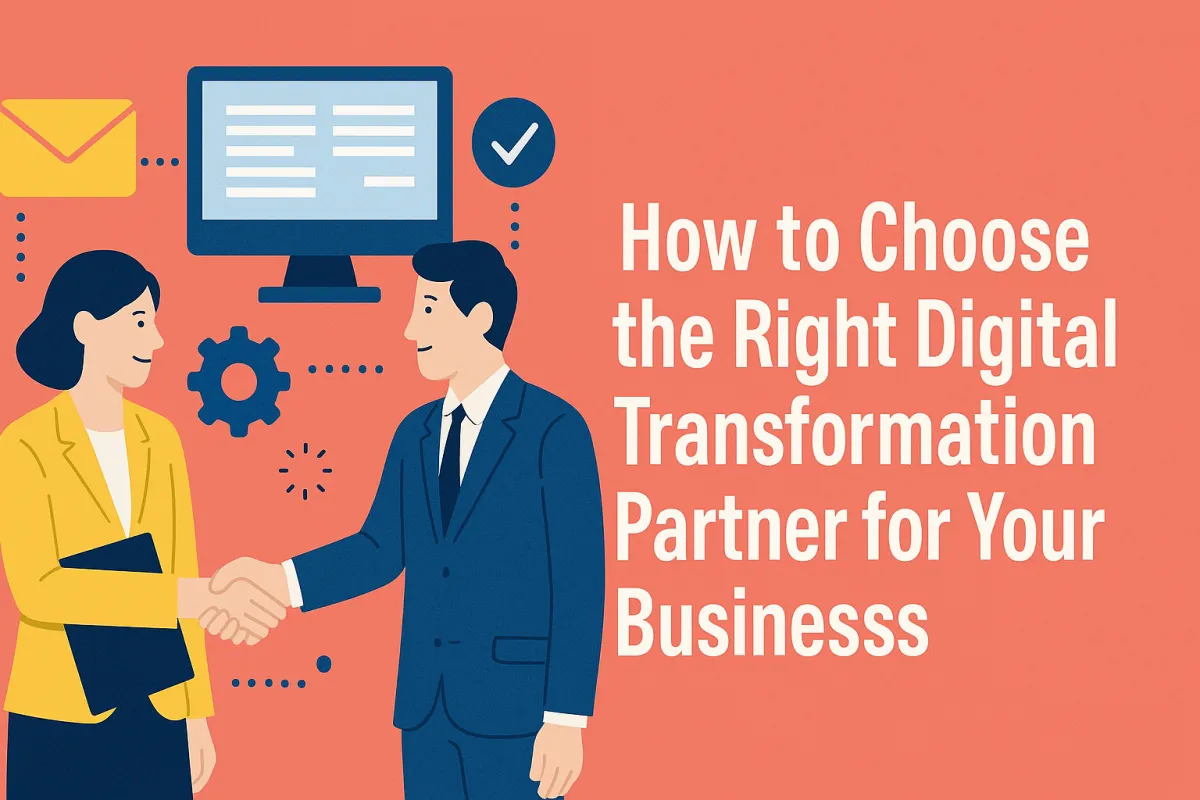
Finding Your Perfect Digital Partner
Choosing a digital transformation partner is a big decision. The right partner can help your business grow, streamline operations, and avoid costly mistakes. The wrong one can slow you down or waste your money. Below are key things to know so you pick wisely.
1. Define Your Goals Before You Decide
Before you start interviewing partners, get clear on what you want to achieve. That might include:
Automating customer communication
Moving your systems to the cloud
Improving internal workflows
Gaining data insights
If you don’t know where you’re going, it’s hard to evaluate whether a partner can get you there. A good partner should ask you for your goals, metrics, and outcomes—not just propose a tool.
2. Check Industry & Technical Expertise
A partner that has worked in your industry or with similar business models will understand your challenges better. They’ll have case studies and references to show what they’ve done.
They also need strong technical skills in the specific areas you need—cloud, analytics, automation, integration, etc. If they don’t have a track record in those technologies, they might overpromise and underdeliver.
3. Culture, Communication & Chemistry Matter
You will be working closely with your transformation partner. If you don’t get along in communication style, if priorities don’t align, or if processes clash, problems will surface.
Ask:
How often will we meet or receive updates?
Who will be working on my project?
How will you handle feedback or changes?
Choose someone who listens, adapts, and communicates clearly.
4. Flexibility & Scalability
As your business evolves, the scope of your digital needs will change. A good partner should be flexible—able to scale up or adjust as your goals shift. Fixed, rigid contracts often backfire.
Look for a partner that offers modular services (you can start small and expand) and who is comfortable pivoting if something doesn’t work out.
5. Proven Track Record & References
Don’t rely only on promises. Demand proof:
Case studies in your or similar industries
Testimonials from past clients
Data showing outcomes (time saved, revenue growth, cost reduction)
Ask them to explain how they achieved results—not just say “we did it.” If a partner can’t connect their work to real business impact, that’s a red flag.
6. Change Management & Training
Digital transformation isn’t just about technology—it’s about people. The partner should help your team adapt. That means training, coaching, change management, and helping your team adopt new systems.
If the partner just builds and walks away, you'll struggle with adoption and sustaining changes.
7. Transparency & Pricing
You don’t want surprises on cost. Good partners give clear, transparent pricing models. Watch out for hidden fees or vague “extras.”
Also ensure there is clarity on ongoing support costs, maintenance, updates, and who owns what in terms of software or code.
8. Support, Maintenance & Ownership
After the initial implementation, you’ll need support, updates, bug fixes, and possible changes. Ensure the partner offers long-term maintenance and clearly defines who owns what (code, assets, IP).
You don’t want to be stuck dependent on them forever.
9. Risk Management & Security
Your partner should take security seriously. You want someone who knows how to protect data, follow compliance rules, and manage risk. Ask about their security protocols, encryption, backups, and disaster recovery.
Also, evaluate how they deal with failures. A partner who plans for risk and has fallback strategies signals maturity.
10. Exit Strategy & Empowerment
A good partner doesn’t make you dependent. They should aim to empower your team to run systems independently over time. Ask:
What’s your exit plan when the project ends?
How will you transfer knowledge to us?
How much of our team will be able to maintain the solutions after your work ends?
Choose a partner that wants you to succeed—even when they no longer lead the project.
If you’re ready to find the right transformation partner or want us to evaluate candidates side by side, contact CLR Solutions. We’d be glad to help you pick someone who fits your business.
5 FAQs
Q1. Do I need a partner if I already have an IT provider?
A: Sometimes your IT provider is enough, but digital transformation often requires mindset, strategy, change management, and specialized skills. If your IT provider lacks those, a transformation partner adds value. Want help evaluating whether you need a partner? Reach out here
Q2. How much should I budget for a partner?
A: It depends on your goals, size, and complexity. Start small and scale. A partner should help you define ROI so you know what you’re getting. We can help you estimate a realistic budget. Contact us
Q3. How long does a digital transformation partnership last?
A: It varies—some projects are 6 months, some are years. Often there’s an initial build phase, then ongoing support and evolution. We can help map a timeline for your business. Let’s talk
Q4. What if a partner promises “magic changes”?
A: Be cautious. Every business is unique, and change takes time and effort. Partners who oversell or use buzzwords without substance may leave you disappointed. We can help you spot realistic vs. overpromised partners. Get in touch
Q5. Can I switch partners mid-project?
A: Yes, but it’s risky and costly. It’s better to pick carefully up front. But if your current partner isn’t delivering, switching may be necessary. Always have documentation and contracts that protect you. If you’re considering switching or want a safety check now,reach out to us

